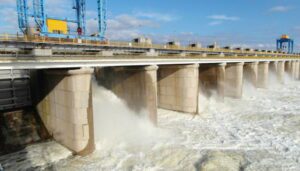
German Minister of Agriculture Cem Ozdemir called for thinking about creating not temporary, but permanent alternative routes for the export of grain from Ukrainian territory, the EFE agency reports on Friday.
“The Black Sea cannot be considered as a safe route for Ukraine in the long term, even after the end of hostilities,” the minister suggested at a press conference. For this reason, according to the minister, “it is necessary to look for one or more permanent alternative routes.”
EFE notes that Ozdemir is skeptical about the chances of success in negotiations with the Russian Federation on the export of grain from Ukrainian ports.

The leaders of the European Union called on the European Commission to promptly present its proposals for EU support for Ukraine in the reconstruction of the country after the war waged against it by Russia.
The conclusions, adopted at the European Council meeting on Thursday in Brussels, noted that the European Commission “soon will submit a proposal to provide Ukraine with a new exceptional macro-financial assistance of up to 9 billion euros in 2022.”
“The European Council calls on the Commission to promptly present its proposals for EU support for the reconstruction of Ukraine, in consultation with international partners, organizations and experts,” the document reads.

Some 47.38% of electricity sold on the day ahead market (DAM) and intraday market (IDM) in May was produced from hydropower, and 20.34% from nuclear fuel, according to a report by JSC Market Operator on environmental aspects for May 2022.
“The share of electricity sold on DAM and IDM, produced from solar energy, amounted to 17.24% in May, from coal – 5.66%, from natural gas – 4.32%, from wind energy – 1.61%, from biogas – 0.99%, from biomass – 0.25%, and from fuel oil – 0.18%,” the report says.
According to the published data, in May, 1.63% of electricity was sold on the spot market, the source of which is not determined, and the origin of another 0.4% of electricity is unknown due to the failure of some market participants to provide relevant information, the company noted.
As follows from the report, in total, in May 2022, 31.5% less electricity was sold on DAM and IDM compared to April – 528,284 MWh versus 770,883 MWh, respectively, in 56.5% less than in March (1.243 million MWh), 88.5% less than in February (4.607 million MWh) and 89.3% less than in January 2022 (4.924 million MWh).
According to Market Operator, out of the total volume of electricity generated in January-May this year, 32.35% was produced from nuclear fuel, 26.58% – from coal, 14.33% – from hydropower, 7.72% – from natural gas, 4.74% – from wind energy, 3.74% – from solar energy, 2.06% – from fuel oil, 0.55% – from biogas, and 0.33% – from biomass.

It is planned to merge the Ministry of Agrarian Policy and Food with the Ministry of Economy by the end of 2022 and create a new Ministry of Economic Development and Innovation.
According to the General Plan for the Transformation of the Executive Power in Ukraine, which is at the disposal of the specialized publication Agroportal, the united ministries will be included in the Economic Growth and Innovation block.
According to him, the united department will be tasked with deepening processing in the Ukrainian agro-industrial complex, as well as increasing the export of agricultural products.
In general, 20 ministries functioning in the country are planned to be united into 12.
As reported, in August 2019, the Verkhovna Rada approved the merger of the Ministry of Agrarian Policy and the Ministry of Economy into the Ministry of Economic Development, Trade and Agriculture.
In 2020, the Cabinet of Ministers recreated the Ministry of Agrarian Policy by canceling its affiliation with the Ministry of Economic Development, Trade and Agriculture and determined its number at 203 people.

Mayor of Bucha (Kyiv region) Anatoliy Fedoruk and Mayor of Bergamo (Italy) Giorgio Gori signed an agreement on cooperation and partnership, the press service of Bergamo municipality reports.
“I believe that cooperation between cities is very important. And I hope that other Italian and Ukrainian municipalities can follow the path paved by Bergamo and Bucha. We will propose the government to allocate some of the resources that Italy has decided to send to support Ukraine for this form of cooperation. Direct cooperation between cities can be a particularly effective way to address the problems of Ukrainian local communities and quickly provide concrete support,” Gori said.
In particular, Bergamo, thanks in part to the work of CESVI, a non-governmental organization that has been working in Ukraine for several weeks with various projects, will help Bucha reopen the city’s child services and kindergartens, three of which were destroyed during the occupation.
Gori also said that, at the request of Fedoruk, he would involve the Association of Architects of Bergamo for consultations on the development of urban plans and reconstruction of the city.

Ukraine’s real gross domestic product (GDP) in 2022 will decrease by 33%, the main factors of the decline will be massive losses in production, demand and exports, according to the updated macroeconomic forecast of the analytical department of Alfa-Bank Ukraine.
Ukraine’s GDP will fall by 30% in 2022, and the country’s economy will grow by 25% next year, the European Bank for Reconstruction and Development (EBRD) published such an updated forecast, while in March it estimated this year’s decline at 20%, and growth in the next year at 23%.
Ukraine’s GDP in 2022 will fall by 30%, subject to a protracted war until the end of the year, and subject to a truce and the possible opening of ports – by 22-25%, such estimates were voiced by Dragon Capital Head Tomas Fiala.
Ukraine’s GDP in 2022 will decrease by 30%, however, the unblocking of seaports would reduce the economic decline to 22-25%, Olena Bilan, chief economist at Dragon Capital, believes.
S&P Global Ratings lowered its foreign currency long- and short-term sovereign credit ratings on Ukraine to ‘CCC+/C’ from ‘B-/B’, the rating agency said.
The deficit of Ukraine’s foreign trade in goods in January-March 2022 decreased by 40 times compared to the same period in 2021 – to $31.6 million from $1.272 billion, the State Statistics Service reported.
The negative balance of Ukraine’s foreign trade in goods in April this year amounted to $191 million compared to a $900 million positive balance in March, the State Customs Service said.
According to its data and previously released data from the State Statistics Service, imports in April increased by about 63.3% compared to March, to $2.87 billion, while exports increased by only 0.8%, to $2.67 billion.
Inflation in Ukraine in annual terms in April may increase to 15.9% from 13.7% in March, this forecast was given by Governor of the National Bank of Ukraine Kyrylo Shevchenko, referring to the NBU estimates based on web-scraping (a method of collecting prices from online supermarkets).
Ukraine’s total state debt in April grew by 0.84% in U.S. dollars to $97.62 billion, in hryvnias – by 0.84% to UAH 2.855 trillion, according to data on the website of the Ministry of Finance.
During the three months of the war, the construction industry of Ukraine has decreased more than 70%, despite the dot resumption of work at construction sites in Ukraine, while the cost of construction has increased by 20%, Director General of the Kovalska Industrial-Construction Group Serhiy Pylypenko has said.
Economic Monitoring’s Project Manager – PhD in Economics, Maksim Urakin
Video dedicated to macro economic figures is available via link https://youtu.be/dwh7Q6aZZBA